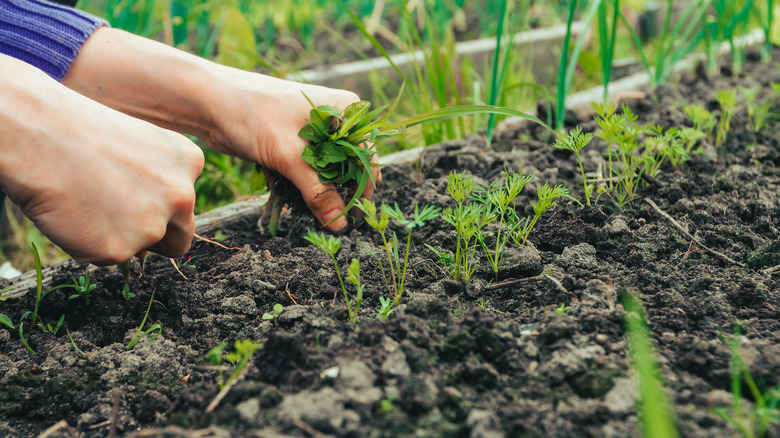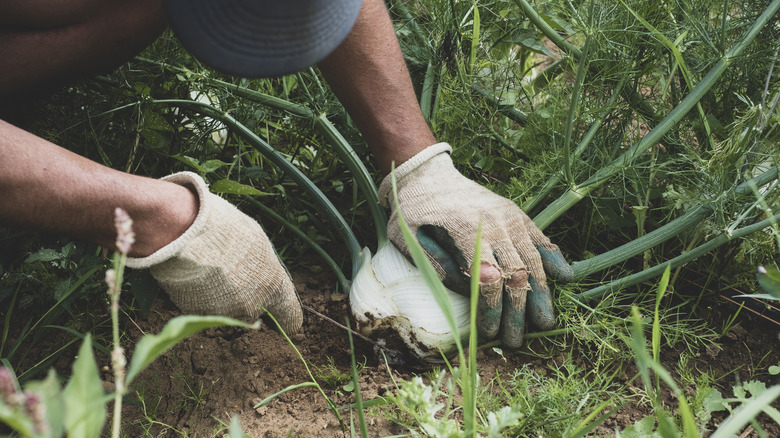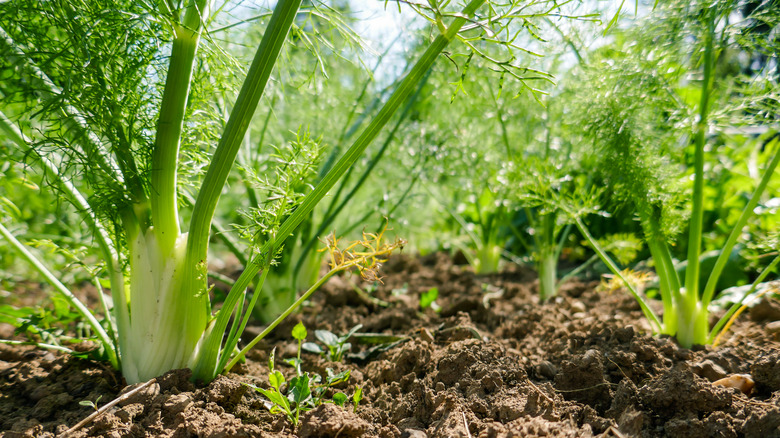The Herb That Will Not Mesh Well With A Variety Of Plants In Your Garden
If you've been gardening for a while, then you've probably already heard of companion planting, which is when you strategically plant certain species of vegetables and flowers near each other because they help one another grow – like roses and geraniums or marigolds. However, what you may not know is that some plants act as the opposite of companion plants and should never be planted near each other because they negatively impact one another — like strawberries and raspberries. There are also certain types of garden plants that tend not to mesh well with most other plants including one particularly common and delicious herb: fennel.
That's right, this aromatic herb that tastes great with potatoes, tomatoes, and peppers actually works against these same vegetables when growing in the garden. This is especially disappointing because fennel can seem like the perfect garden addition since it is so low maintenance, hardy, and easy-to-grow. Unfortunately, sometimes fennel grows too well, and as one Redditor on r/gardening explained, if you plant fennel "it will kill all the plants by smothering them with its own over-exuberant growth." However, that's not the only reason that fennel gets a bad rap.
Why fennel doesn't work well with other plants
On top of the fact that fennel is a fast grower that can easily overpower and crowd-out your other garden plants, this delicious herb is also hiding a toxic secret. In fact, fennel is actually an allelopathic plant meaning that (like black walnut trees, sunflowers, and the not-so-heavenly and invasive tree of heaven) this herb releases a toxin from its roots into the surrounding soil that can hamper the growth of other plants. Certain plants that are particularly sensitive to this toxin include nightshades like tomatoes, peppers, eggplants, and potatoes as well as any plants in the legume family like beans and peas.
However, it is also important to note that — despite being allelopathic — fennel is not an 'evil' plant that should never be put in the garden. In fact, fennel has many benefits including that it is one of those garden plants that naturally repels pests and it even does a good job of attracting beneficial pollinators. So, how can you plant fennel in your garden without harming your other veggies?
How to successfully incorporate fennel into your garden
Despite its allelopathic qualities, luckily, there are a few ways you can get fennel to play nice with others in the garden. The first is to isolate your fennel by planting it in one corner of the garden away from other plants that it might harm. This way you can still benefit from your fennel attracting pollinators while preventing it from inhibiting the growth of your other vegetables. To prevent your fennel from spreading and smothering out other plants, you can also plant the herb in pots to help contain its growth.
Another option is to separate the fennel in your garden from vegetables that are sensitive to its toxins with rows of more-resistant plants. Plants that are resistant to allelopathic plant toxins and grow well near fennel include anise, marigolds, and nasturtiums. Anecdotally, another Redditor on r/gardening pointed out that fennel doesn't seem to affect leafy green plants like "kale, collards, or Swiss chard" which, in their garden, ended up "trying hard to smother the fennel" instead of the other way around.


